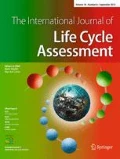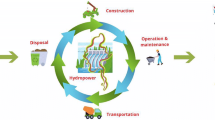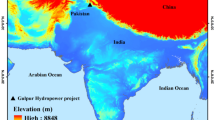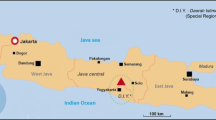Abstract
Purpose
Hydropower is currently the primary renewable energy source for Myanmar. However, hydropower projects can cause direct and indirect detrimental impacts on the livelihoods of populations. Social impacts of planned hydropower projects should therefore be assessed. In this paper, we report on the application of a Social Life Cycle Assessment (S-LCA) for evaluating social and human rights impacts of hydropower construction, operation and maintenance, and transportation of materials.
Material and method
S-LCA is capable of assessing multiple social stressors and tracking different impact categories within potentially disturbed communities. Both direct and indirect interaction between stakeholders and social impacts at every stage of a project can be evaluated. An existing large-scale hydropower dam in the Ayeyarwady River, Shweli hydropower dam 1, is used in this paper as an example for analysis.
Results
Results indicate the magnitude and intensity of social and human right impacts caused by the Shweli hydropower dam 1 in Myanmar. The dam gives rise to a series of negative impacts while offering little to no tangible benefits to local people and society. Overall, the most commonly held view expressed by stakeholders was that the dam did not offer the promised social and economic benefits. The weakest social performance was observed in the governance and socio-economic repercussion categories.
Conclusion
A number of important socio-economic impacts are identified, offering useful insights to energy, ecosystem services, and land use policy makers. The results offer opportunities to examine potential impacts of forthcoming hydropower projects in the region and create long-term socio-economic benefits.


Similar content being viewed by others
Notes
“Rent-seeking is a concept in economics that states that an individual or an entity seeks to increase their own wealth without creating any benefits or wealth to the society” (Corporate Finance Institute, 2017).
References
Almeida ACL (2019) Multi actor multi criteria analysis (MAMCA) as a tool to build indicators and localize sustainable development goal 11 in Brazilian municipalities. Heliyon 5(8):e02128. https://doi.org/10.1016/j.heliyon.2019.e02128
Angelo ACM, Saraiva AB, Clímaco JCN, Infante CE, Valle R (2017) Life Cycle Assessment and Multi-criteria Decision Analysis: selection of a strategy for domestic food waste management in Rio de Janeiro. J Clean Prod. https://doi.org/10.1016/j.jclepro.2016.12.049
Arcese G, Benoît-Norris C, Berger M, Ekener E, Finkbeiner M, Garrido SR, Lehmann A, Neugebauer S, Schaubroeck T, Traverso M, Valdivia S (2020) Guidelines for social life cycle V3 Draft (Issue February 2020)
Arcese G, Lucchetti MC, Massa I, Valente C (2018) State of the art in S-LCA: integrating literature review and automatic text analysis. INT J LIFE CYCLE ASS 23(3):394–405. https://doi.org/10.1007/s11367-016-1082-0
Aung TS (2019) The current situation of Myanmar’s environemntal and natural resource governance. In Myanmar: Environmental, Political and Social Issues (Issue July). https://novapublishers.com/shop/myanmar-environmental-political-and-social-issues/
Aung TS, Fischer TB, Azmi AS (2020) Are large-scale dams environmentally detrimental? Life-cycle environmental consequences of mega-hydropower plants in Myanmar. INT J LIFE CYCLE ASS 1:1–23. https://doi.org/10.1007/s11367-020-01795-9
Brown PH, Magee D, Xu Y (2008) Socioeconomic vulnerability in China’s hydropower development. China Econ Rev 19(4):614–627. https://doi.org/10.1016/j.chieco.2008.06.002
Chen, T. F., L. K., S. H., D. F., A. D., S. W., Y. (2014) Large hydropower and legitimacy: a policy regime analysis, applied to Myanmar.Munich Personal Repect Archive, 80944. https://mpra.ub.uni-muenchen.de/72288/1/MPRA_paper_72288.pdf
Chhipi-Shrestha GK, Hewage K, Sadiq R (2015) “Socializing” sustainability: a critical review on current development status of social life cycle impact assessment method. CLEAN TECHNOL ENVIR 17(3):579–596. https://doi.org/10.1007/s10098-014-0841-5
Corona B, Bozhilova-Kisheva KP, Olsen SI, San Miguel G (2017) Social Life Cycle Assessment of a concentrated solar power plant in spain: a methodological proposal. J Ind Ecol 21(6):1566–1577. https://doi.org/10.1111/jiec.12541
Corporate Finance Institute (2017) Rent-seeking—definition, common examples, and Tullok paradox. What Is Rent-Seeking? https://corporatefinanceinstitute.com/resources/knowledge/economics/rent-seeking/
Dapice D (2016) To build or bot to build? Designing Sustainable Hydro for Federalism in Myanmar (Issue February). https://ash.harvard.edu/files/ash/files/20160219_to_build_or_not_to_build_designing_sustainable_hydro_projects_in_myanmar_eng.pdf?m=1456347698
De Felice F, Campagiorni F, Petrillo A (2013a) Economic and environmental evaluation via an integrated method based on LCA and MCDA. Procedia Soc Behav Sci. https://doi.org/10.1016/j.sbspro.2013.10.465
De Felice F, Campagiorni F, Petrillo A (2013b) Economic and environmental evaluation via an integrated method based on LCA and MCDA. Procedia Soc Behav Sci 99(November):1–10. https://doi.org/10.1016/j.sbspro.2013.10.465
Environmental and Social Working Group. (2019). Shweli 3 hydropower project human rights (and Conflicts) impact assessment and management (Issue May).
De Faria FAM, Davis A, Severnini E, Jaramillo P (2017) The local socio-economic impacts of large hydropower plant development in a developing country. Energy Econ 67:533–544. https://doi.org/10.1016/j.eneco.2017.08.025
Fortier MOP, Teron L, Reames TG, Munardy D. T, Sullivan BM (2019) Introduction to evaluating energy justice across the life cycle: a social life cycle assessment approach. Applied Energy, 236(October 2017), 211–219. https://doi.org/10.1016/j.apenergy.2018.11.022
Geller M, Meneses AADM (2016) Life cycle assessment of a small hydropower plant in the Brazilian Amazon. J Sustain Dev Energy Water Environ Syst. https://doi.org/10.13044/j.sdewes.2016.04.0029
Günkaya Z, Özdemir A, Özkan A, Banar M (2016) Environmental performance of electricity generation based on resources: aa life cycle assessment case study in Turkey. Sustainability (Switzerland). https://doi.org/10.3390/su8111097
Han KT (2018) Possible socioeconomic consequences of the hydropower dams on the downstream communities: case study Hatgyi Dam 6(2), 237–251. https://doi.org/10.13189/sa.2018.060205
Hedström J (2019) Myanmar in transition: China, conflict, and ceasefire economies in Kachin State. https://doi.org/10.13140/RG.2.2.18309.40164
Hisschemöller M, Cuppen E (2015) Participatory assessment: tools for empowering, learning and legitimating? In The tools of policy formulation: actors, capacities. Venues and Effects doi 10(4337/9781783477043):00013
IEA (2000) Implementing agreement for hydropower technologies and programmes, annex III, hydropower and the environment: present context and guidelines for future action (subtask 5 report) -- volume ii: main report. International Energy Agency, II (May). http://www.ieahydro.org/reports/HyA3S5V2.pdf
Institute for Human Rights and Business (2012) Responsible investment in Myanmar. In Institute for Human Rights and Business 53(9). https://doi.org/10.1017/CBO9781107415324.004
International Energy Agency. (2000). Survey of the environmental and social impacts and the effectiveness of mitigation measures in hydropower development.
International Finance Corporation (2018a) Baselien assessment report geomorphic and sediment transport strategic environmental assessment of the hydropower sector in Myanmar.
International Finance Corporation (2018b) Strategic environmental assessment of the Myanmar hydropower sector. In The World Bank 69(5). https://doi.org/10.1080/00119253.1968.9940266
International Hydropower Association (2020) 2020 Hydropower status report contents.
International Rivers (2008) The New Great Walls (Issue July)
IRENA (2020) Global Renewables Outlook: Energy transformation 2050. In International Renewable Energy Agency. https://www.irena.org/publications/2020/Apr/Global-Renewables-Outlook-2020
Kachin Environmental Organization (2004) Damming the Irrawaddy. https://burmariversnetwork.org/images/stories/publications/english/dammingtheirrawaddy.pdf
Karen Human Rights Group (2018) Development or destruction? The human rights impacts of hydropower development on villagers in Southeast Myanmar. www.khrg.org,
Kattelus M, Rahaman MM, Varis O (2015) Hydropower development in Myanmar and its implications on regional energy cooperation. Int J Sustain Soc 7(1):42–66. https://doi.org/10.1504/IJSSOC.2015.068071
Lenzo P, Traverso M, Salomone R (2017) Social Life Cycle Assessment in the textile sector : an Italian case study sustainability. June 2018. https://doi.org/10.3390/su9112092
Liu X, Li Z, Liao C, Wang Q, Zhu A, Li D, Li Y, Tang Z (2015) The development of ecological impact assessment in China. Environ Int 85:46–53. https://doi.org/10.1016/j.envint.2015.08.004
De Luca AI, Iofrida N, Strano A, Falcone G, Gulisano G (2015) Social Life Cycle Assessment and participatory approaches : a methodological proposal applied to citrus farming in Southern Italy 11(3):383–396. https://doi.org/10.1002/ieam.1611
Macombe C, Leskinen P, Feschet P, Antikainen R (2013) Social life cycle assessment of biodiesel production at three levels: a literature review and development needs. J Clean Prod 52:205–216. https://doi.org/10.1016/j.jclepro.2013.03.026
Manik Y, Leahy J, Halog A (2013) Social life cycle assessment of palm oil biodiesel: a case study in Jambi Province of Indonesia. INT J LIFE CYCLE ASS 18(7):1386–1392. https://doi.org/10.1007/s11367-013-0581-5
Martínez-Blanco J, Lehmann A, Muñoz P, Antón A, Traverso M, Rieradevall J, Finkbeiner M (2014) Application challenges for the social Life Cycle Assessment of fertilizers within life cycle sustainability assessment. J Clean Prod. https://doi.org/10.1016/j.jclepro.2014.01.044
Middleton C, Lamb V (2019) The Anthropocene: Politik — Economics — Society — Science Knowing the Salween River : Resource Politics of a Contested Transboundary River (1st ed.), Springer
Opperman J, Hartmann J, Raepple J, Angarita H, Beames P, Chapin E, Geressu R, Grill G, Julien H, Hurford A, Kammen D, Kelman R, Martin E, Martins T, Peters R, Rogéliz C, Shirley R (2017) The Power of Rivers A Business Case
Pacca S (2007) Impacts from decommissioning of hydroelectric dams: a life cycle perspective. Climatic Change 84(3–4):281–294. https://doi.org/10.1007/s10584-007-9261-4
Pant R, Aggarwal S, Joshi K (2016) Life Cycle Assessment of small hydro power plants in Uttarakhand. Int j curr 6(1):289–294
Pascale A, Urmee T, Moore A (2011) Life cycle assessment of a community hydroelectric power system in rural Thailand. Renewable Energy 36(11):2799–2808. https://doi.org/10.1016/j.renene.2011.04.023
Recchia L, Boncinelli P, Cini E, Vieri M, Pegna FG, Sarri D (2011) Multicriteria analysis and LCA techniques: with applications to agro-engineering problems. Green Energy and Technology. https://doi.org/10.1007/978-0-85729-704-4
de Ribeiro F, M., & da Silva, G. A. (2010) Life-cycle inventory for hydroelectric generation: a Brazilian case study. J Clean Prod 18(1):44–54. https://doi.org/10.1016/j.jclepro.2009.09.006
Rivera-Huerta A, Lozano M, de la SR, Padilla-Rivera A, Güereca LP (2019) Social sustainability assessment in livestock production: a social life cycle assessment approach. Sustainability (Switzerland), 11(16). https://doi.org/10.3390/su11164419
Siebert A, Bezama A, O’Keeffe S, Thrän D (2018) Social life cycle assessment indices and indicators to monitor the social implications of wood-based products. J Clean Prod 172:4074–4084. https://doi.org/10.1016/j.jclepro.2017.02.146
Simmance A (2013) Environmental flows for the Ayeyarwady (Irrawaddy) River Basin. Myanmar. Unpublished, In UNESCO-IHE Online Course on Environmental Flows
Simpson A (2013) Challenging hydropower development in Myanmar (Burma): cross-border activism under a regime in transition. Pacific Review 26(2):129–152. https://doi.org/10.1080/09512748.2012.759264
Sovacool BK (2013) Confronting energy poverty behind the bamboo curtain: a review of challenges and solutions for Myanmar (Burma). ENVIRON DEV SUSTAIN 17(4):305–314. https://doi.org/10.1016/j.esd.2013.03.010
Sureau S, Neugebauer S, Achten WMJ (2020) Different paths in social life cycle impact assessment (S-LCIA)—a classification of type II impact pathway approaches. INT J LIFE CYCLE ASS 25(2):382–393. https://doi.org/10.1007/s11367-019-01693-9
Ta’ang Student and Youth Organization (2007) Under the Boot. Under the Boot. https://doi.org/10.1093/infdis/jis087
Ta’ang Student and Youth Organization (2011) Shweli under siege Dams proceed amid war in Burma, pp 1-34
Takeda S, Keeley AR, Sakurai S, Managi S, Norris CB (2019) Are renewables as friendly to humans as to the environment?: a social life cycle assessment of renewable electricity. Sustainability (Switzerland), 11(5). https://doi.org/10.3390/su11051370
The Nature Conservancy (2016) Improving hydropower outcomes through system-scale planning: An example from Myanmar.
The World Bank (2009) Shweli River Cascade 1 Hydropower Station Snapshots - Private Participation in Infrastructure (PPI) - World Bank Group. https://ppi.worldbank.org/en/snapshots/project/shweli-river-cascade-1-hydropower-station-4576
Tsai LS (2015) Gender and hydropower in Myanmar today. https://www.oxfam.org.au/wp-content/uploads/2015/09/2015-30-Myanmar-Country-Report_FA_WEB.pdf
UNEP (2019) Social LCA Guidelines revision and pilot move forward – Life Cycle Initiative. Life Cycle Initiative. https://www.lifecycleinitiative.org/social-lca-guidelines-revision-and-pilot-move-forward/
United Nations Environment Programme. (2009). Guideline For Social Life Cycle Assessment.
United Nations Environment Programme (2013) The methodological sheets for sub-categories in Social Life Cycle Assessment (S-LCA)
Urban F, Nordensvärd J, Khatri D, Wang Y (2013) An analysis of China’s investment in the hydropower sector in the Greater Mekong Sub-Region. ENVIRON DEV SUSTAIN 15(2):301–324. https://doi.org/10.1007/s10668-012-9415-z
Vanclay F (2003) International principles for social impact assessment. Impact Assess Proj Appraisal 21(1):5–12. https://doi.org/10.3152/147154603781766491
WWF (2018) The Ayeyarwady river and the economy of Myanmar. Volume 1: Risks and opportunities from the perspective of people living and working in the basin (Vol. 1).
Yee H (2016) Implications on women ’ s lives and livelihoods: a case study of villages to be affected by the Mongton Dam Project in Shan State. International Conference on the Mekong, Salween and Red Rivers: Sharing Knowledge and Perspectives Across Borders, November, 308–339
Yee HW (2017) Large hydropower projects in ethnic areas in Myanmar: placing community participation and gender central to
Zaehringer JG, Lundsgaard-Hansen L, Thein TT, Llopis JC, Tun NN, Myint W, Schneider F (2020) The cash crop boom in southern Myanmar: tracing land use regime shifts through participatory mapping. Ecosystems and People 16(1):36–49. https://doi.org/10.1080/26395916.2019.1699164
Zanghelini GM, Cherubini E, Soares SR (2018) How multi-criteria decision analysis (MCDA) is aiding Life Cycle Assessment (LCA) in results interpretation. Clean. Prod, In J. https://doi.org/10.1016/j.jclepro.2017.10.230
Zimdars C, Haas A, Pfister S (2017) Enhancing comprehensive measurement of social impacts in S-LCA by including environmental and economic aspects. Int J Life Cycle Assess 23:133–146. https://doi.org/10.1007/s11367-017-1305-z
Author information
Authors and Affiliations
Corresponding author
Ethics declarations
Conflict of interest
The authors declare that they have no conflict of interest.
Ethical statement
All procedures performed in studies involving human participants were in accordance with the ethical standards of the institutional and/or national research committee or comparable ethical standards. This research does not contain any studies with animals performed by any of the authors. Informed consent was obtained from all individual participants included in the study.
Additional information
Communicated by Marzia Traverso.
Publisher’s Note
Springer Nature remains neutral with regard to jurisdictional claims in published maps and institutional affiliations.
Supplementary Information
Below is the link to the electronic supplementary material.
Rights and permissions
About this article
Cite this article
Aung, T.S., Fischer, T.B. & Azmi, A.S. Social impacts of large-scale hydropower project in Myanmar: a social life cycle assessment of Shweli hydropower dam 1. Int J Life Cycle Assess 26, 417–433 (2021). https://doi.org/10.1007/s11367-021-01868-3
Received:
Accepted:
Published:
Issue Date:
DOI: https://doi.org/10.1007/s11367-021-01868-3




